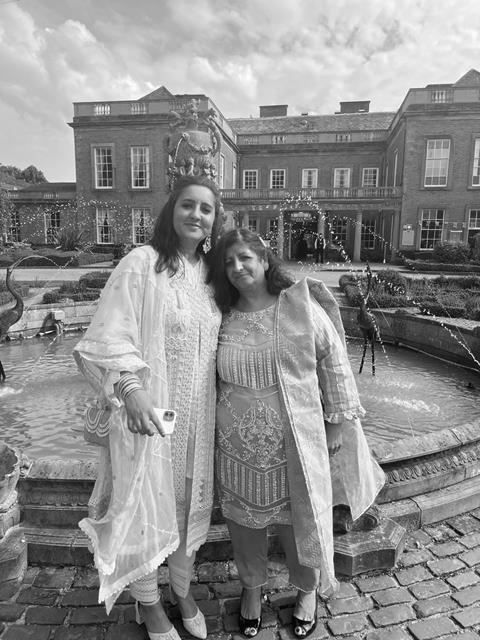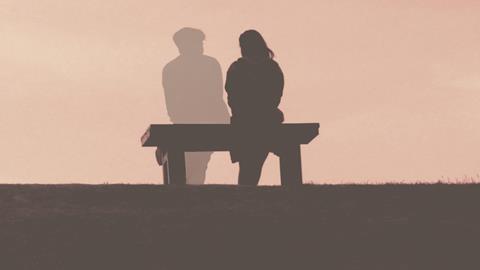When her mother died suddenly, Mandy Gill was not as comforted by her Christian faith as she might have expected. Her fellow believers didn’t always respond well either. Here are the lessons she’s learned from a slow and painful journey with grief
Easter Sunday 2024 looked just like any other day, but with one exception: my sister and I were planning to visit our mother, who was in hospital following a minor operation two days earlier. When we saw her on Good Friday and Holy Saturday, she was tired and a little confused, but we put this down to lack of sleep. When I went to bed on Saturday night, I was worried for her health, but little did I know what the following day would hold.
Earlier that week, my mother had been diagnosed with stage three cancer. The consultants were positive about her prognosis; it was treatable, limited to one location and hadn’t spread. This is, basically, the best news you can expect to receive if you’ve just heard the word ‘cancer’, but still, I remember feeling angry with God, given how much my mum had already suffered during her 61 years on earth. Having faced more than 40 years of severe OCD, to be dealt the cancer card felt unfair. She sat in utter shock, I assume wondering how the God she had always said had promised her a long life and “would not let the deadly pestilence come near” (see Psalm 91), had allowed that very pestilence to ravage her own body.
Part of my mother’s treatment plan included a small, routine operation, which took place on Good Friday. We began to plan for the radiotherapy and chemotherapy treatments that would follow. But at 4am on Easter Sunday, my sister received a call from the hospital. Our mother was seriously unwell. As she was rushed into theatre, I called my stepfather and told him to meet us at the hospital as soon as possible. It was the sort of thing you see in the movies, only there were no cameras rolling.
After a five-hour open surgery, Mum was placed in an induced coma. We were told she could be in the intensive care unit for a week. An hour later, she wasn’t responding to treatment. Another hour or so after that, doctors informed us that we had to turn her life support machine off, otherwise she might go into cardiac arrest, and they would be unable to resuscitate her.
I held my mother’s hand as she took her last breath.
The weeks and months that followed were bizarre and traumatic. As we struggled to come to terms with what happened to her, and how everything had gone so wrong, so quickly, we planned for her funeral. Christian friends helped no end; it looked as if a professional events company had been drafted in to organise the wake.
The sting of death
Loss is difficult for everyone, but there is something especially difficult when it is sudden. With no warning, there isn’t time for the brain to rationalise anything or process the loss. This can lead to panic, and then to fear. There is a deafening quiet in all the words never spoken, and all those you’ll never hear again. A void opens up within you. For months to come, a quick glance towards the spot in the living room where my mother often sat was all it took for the tears to start flowing.
No one tells you that grief can manifest itself physically, doing horrible, painful things to your body. At times, I wondered if there might be something seriously wrong with me, too. On one occasion, I spent hours in Accident and Emergency with excruciating abdominal pain. The doctors expressed concern at my raised blood markers but couldn’t find a root cause. Others, who have also walked through such grief, said: “Trust me, that is grief.” But I didn’t believe them, and worried even more with each new symptom that arose.
In church, we rarely address the subject of dying, outside of triumphant talk about Jesus overcoming death
There is much we don’t understand about grief. In church, we rarely address the subject of dying, outside of triumphant talk about Jesus overcoming death. We sing hymns that proclaim exultant biblical lyrics such as: “O death, where is your sting?” (1 Corinthians 15:55, ESV) but, in my experience, death does have a sting. Of course I’m not denying that as believers, we have an eternal hope and that we will ultimately be with Jesus in paradise. I’m just saying that the death of a loved one can still be immensely painful for those left behind.
I am glad that my mum is now with Jesus, free from the pain and suffering of this life but, honestly, I would still give anything to have her sat beside me, to listen to her hilarious stories and feel the warmth and comfort of the only person who ever loved me unconditionally. No one tells you that when you lose a parent, you often lose the only human who cares how well you’ve slept or if you’ve eaten; the only person who genuinely wants to hear about every single detail of your day.

Help and harm
In the wake of our loss, well-meaning Christians with good intentions offered a plethora of platitudes that felt, to me, as if they were trying to fix something that was broken; to put me back together again in a neat parcel.
Someone I had never spoken to before approached me at church to tell me that Mum “wouldn’t have coped after her operation” anyway. They were trying to provide comfort in the fact that she was dead, rather than being alive and having to adjust. I know which option I would have taken, and my mother, too.
Another friend offered a coffee and a catch-up, but we struggled to find a suitable time around their volunteer commitments at church. Judge me if you like, but church rotas will always be there. If a friend who is grieving the loss of her mother isn’t enough to interrupt your schedule, what is? I texted my friend and offered the opinion that Jesus would probably be OK with them making time to meet with me, but maybe this came from a selfish and judgemental perspective. If you haven’t lost someone in tragic circumstances, maybe you can’t understand the weight and burden of grief, and how the load is so much more bearable if shared.
Others would utter, unhelpfully, that God does not bring anything bad. Some quoted Bible verses out of context, such as: “In all things God works for the good of those who love him” (Romans 8:28). That we live in a fallen world, full of disease, illness, suffering and pain. It didn’t help. If God is in control of everything, why didn’t he give me longer with my mother?
Platitudes such as: “She’s in a better place now” may be designed to help and comfort but, ultimately, they are only a band aid attempt at fixing grief, which just isn’t possible. I know that my mother is in heaven. But this knowledge hasn’t brought instant and immediate acceptance or peace. Before I lost my mum, I might have assumed my Christian faith would make death easier, but it hasn’t. Does this mean I am a bad Christian?
Family and friends provided advice – some helpful, and some that felt judgemental, and expected too much from us at a difficult time. We were told we were responsible for our mum’s legacy and had a responsibility to share the gospel at her funeral and witness to her Sikh family (an evangelistic opportunity seemed to be the main point of Mum’s passing to some). The story of Job was thrown at us more times than I care to remember. I had enough material to fill a book on what not to say to a grieving person.
One Christian asked me if I swore. “No,” I answered. “It might help,” they replied
Some of the kindest words spoken to me in my grief were also by Christians, however. A woman at church told me that she, too, was “angry that God let your mum go”. Maybe those words weren’t theologically appropriate but, in that moment, they felt like a healing balm.
It’s often said that God can handle all of our angry laments, our frustrations and questions, but who is willing to sit with you while you do this? One Christian asked me if I swore. “No,” I answered. “It might help,” they replied. I’m not saying they are right (and for the record, swearing didn’t help me at all), but it was probably one of the most real Christian responses I heard during that time. And that certainly did help.
A friend sent me the scripture: “Though he brings grief, he will show compassion, so great is his unfailing love” (Lamentations 3:32). I was strangely comforted by the reminder that God does actually bring grief and hence was still in control, despite the sudden loss of my mum, even if I was angry at him for this.
Moving on
I’d been warned that people might ‘disappear’ after the funeral, and it was true: there are friends I have not seen or heard from since that difficult day. At first, I was angry. But I realised that the amount of energy expended to initially help someone through their grief is significant, and just isn’t possible to maintain in the long-term.
I also quickly realised that you must ask for what you need, as most people will simply say: “Let me know if you need anything” and won’t be proactive. I unashamedly asked for food during those first few weeks, when I had little energy to provide it for myself while battling my grief – and people happily obliged.
Seven months down the line, my sister and I can count on one hand the people who check in regularly to see how we are doing. In some ways, it is harder now than in the beginning; when the shock passes, the reality of your loss hits home – and that’s when you really need community to process things with.
Ultimately, I don’t have a list of dos and don’ts for comforting someone in their grief. A friend, who had lost parents herself, listened patiently as I told her what had helped me; I thought I was enlightening her, as though I was the first person to lose a parent. When I had finished, she gently pointed out that what worked for me might not work for somebody else – and could in fact make things worse.
I know my mother is in heaven, but this hasn’t brought instant and immediate peace
Grief is deeply unique to each person. But one thing we must not do is avoid those who are grieving for fear of not knowing what to say. This is probably the reaction that I least expected from the Church and, therefore, it was in many ways the most hurtful.
I have learned that grief is essentially all the cliches people say it is. Unique, lonely, isolating and life-changing. It’s a path that none of us ever want to walk down, but every one of us must eventually face. The bittersweet reality of living, loving and eventually losing…until we meet again.




































No comments yet